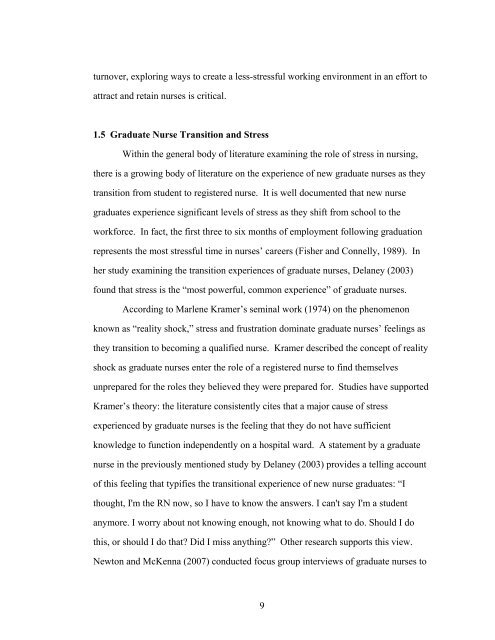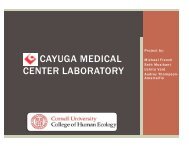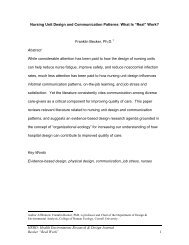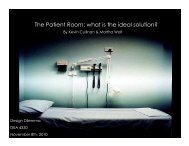The role of physical design and informal communication
The role of physical design and informal communication
The role of physical design and informal communication
Create successful ePaper yourself
Turn your PDF publications into a flip-book with our unique Google optimized e-Paper software.
turnover, exploring ways to create a less-stressful working environment in an effort to<br />
attract <strong>and</strong> retain nurses is critical.<br />
1.5 Graduate Nurse Transition <strong>and</strong> Stress<br />
Within the general body <strong>of</strong> literature examining the <strong>role</strong> <strong>of</strong> stress in nursing,<br />
there is a growing body <strong>of</strong> literature on the experience <strong>of</strong> new graduate nurses as they<br />
transition from student to registered nurse. It is well documented that new nurse<br />
graduates experience significant levels <strong>of</strong> stress as they shift from school to the<br />
workforce. In fact, the first three to six months <strong>of</strong> employment following graduation<br />
represents the most stressful time in nurses’ careers (Fisher <strong>and</strong> Connelly, 1989). In<br />
her study examining the transition experiences <strong>of</strong> graduate nurses, Delaney (2003)<br />
found that stress is the “most powerful, common experience” <strong>of</strong> graduate nurses.<br />
According to Marlene Kramer’s seminal work (1974) on the phenomenon<br />
known as “reality shock,” stress <strong>and</strong> frustration dominate graduate nurses’ feelings as<br />
they transition to becoming a qualified nurse. Kramer described the concept <strong>of</strong> reality<br />
shock as graduate nurses enter the <strong>role</strong> <strong>of</strong> a registered nurse to find themselves<br />
unprepared for the <strong>role</strong>s they believed they were prepared for. Studies have supported<br />
Kramer’s theory: the literature consistently cites that a major cause <strong>of</strong> stress<br />
experienced by graduate nurses is the feeling that they do not have sufficient<br />
knowledge to function independently on a hospital ward. A statement by a graduate<br />
nurse in the previously mentioned study by Delaney (2003) provides a telling account<br />
<strong>of</strong> this feeling that typifies the transitional experience <strong>of</strong> new nurse graduates: “I<br />
thought, I'm the RN now, so I have to know the answers. I can't say I'm a student<br />
anymore. I worry about not knowing enough, not knowing what to do. Should I do<br />
this, or should I do that? Did I miss anything?” Other research supports this view.<br />
Newton <strong>and</strong> McKenna (2007) conducted focus group interviews <strong>of</strong> graduate nurses to<br />
9







